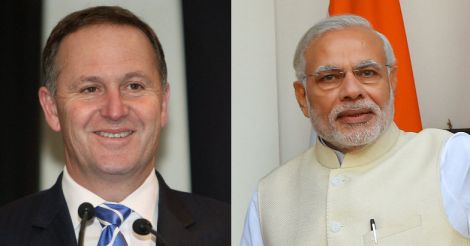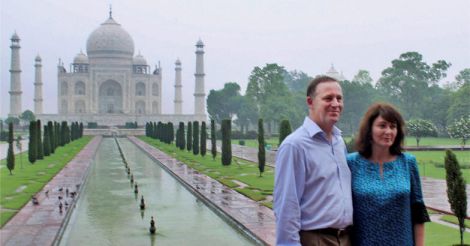New Zealand is the second country in the world to grant women the right to vote, and India was one of the first countries to have a woman prime minister. With an economy of $174 billion (2015) and a population of 4.6 million, New Zealand is a much smaller country compared to India. However, New Zealand can easily become an ideal partner to India in both geopolitics and economy.
India may know New Zealand as the small country that always gave us a scare in cricket and hockey. This is because in the sports they specialize in, this small country always fought hard and brought home the bacon -- winning a total of 18 medals including four golds in the recent Rio Olympics.
New Zealand is perhaps the first country in the world that shook off its ghosts from the colonial past, honoring the treaty between the ethnic Maoris and the British colonialists. They compensated the Maoris for the acquisition of land and other assets such as mining and fishing rights.
Also read: When I connected with Ganesha - in New Zealand
 New Zealand's prime minister John Key and Indian PM Narendra Modi. File photo
New Zealand's prime minister John Key and Indian PM Narendra Modi. File photoIn today’s world, multiple layers of bureaucracy and process-oriented conventional thinking are the greatest impediments to sustainable growth and securing an emphatic win for any organization or country. Whether it is the rapid response required to eliminate terrorists who are on a rampage or putting that two hundred quick runs on the board, one requires quick decision making skills in unfamiliar territories. And this is where the genius of New Zealand can help a large country like India to drive growth through innovation. India’s software strength and its growing number of entrepreneurs who continuously create that power, could form great partnerships to set up platforms in New Zealand and gear up to secure world markets for their products and services.
What is the secret of success of this small country and what is its significance to India? Kiwis have used their small-country status to their advantage to continuously innovate and excel in sports, agriculture and horticultural industries, and become a net exporter while continuing to occupy the developed-nation status. The Heritage Foundations’ 2016 Index of Economic Freedom ranks New Zealand at number three, behind Hong Kong and Singapore. Overhauling of the tax regime with the introduction of Goods and Service Tax ( GST) in 1985, and privatization of a number government enterprises including power distribution companies (DISCOMs) in the 1990s were historic turning points for the New Zealand economy. New Zealand’s success stories are great case studies for state governments across India seeking to transform their respective economies following the much-anticipated introduction of GST in India.
I have identified seven specific opportunities and related issues that make this partnership compelling to both countries.
1. India is a large country with a federal-state structure, with related socio-political and administrative complexities and inequalities. It requires a cheetah-like partner country that could nurture India-born innovations and entrepreneurs and fast-track the “go to” market process. Bilateral partnerships between smart cities and knowledge hubs across the country where India’s core strengths of software super power resides, could take their innovation to nurture and productionize “the new ideas” in New Zealand.
2. New Zealand’s core strength is captured in her brand positioning tag line – “100% pure New Zealand.” It is one of the purest countries on the planet, and their agriculture/horticultural products command a high level of government scrutiny and purity. Genetically Modified (GM) food is one of the biggest health hazards facing Indians, and New Zealand could assist India to develop “smart organic farms” for manufacturing 100 percent pure organic food products on a large scale across the country in alliance with state governments. The Indian diaspora in New Zealand is highly successful in the agriculture sector -- market gardeners as they are known in New Zealand, that the town of Pukekohe south of Auckland is popularly known as the Bombay Hill! The Indian diaspora could quickly bridge relationships to fast-track “smart organic farms” in India to produce everything from kiwi fruits to New Zealand avocados.

Also read: My encounter with the curse of God’s own country
3. The fisheries industry is New Zealand is highly developed and produces some of the world’s best sea food. New Zealand could quickly develop bilateral partnerships with Indian coastal states to develop their fishing industry and assist them to develop sea food products and jointly explore the world markets for the same.
4. Although India is a net importer of wood and wooden products, New Zealand’s share of this market has been relatively small compared to countries like Indonesia and Malaysia, in part because of India’s preference for hard wood over New Zealand soft wood species, pine. But with India’s domestic dwelling-construction market expanding across the country, there are niche markets for New Zealand pine wood. To get into this highly disorganized import market of wood products and logs in India, New Zealand requires state-level alliances targeting these niche markets.
5. The motivation, tenacity, never give up attitude and the sporty spirit of New Zealand is legendary, as documented well by New Zealander Edmund Hillary’s conquest of Mount Everest. For India to win its due share of medals in Olympics and other sports, we could do with some new age coaching techniques, talent identification, nurturing and development. New Zealand could develop partnerships with state governments like Kerala that are committed to developing sports talents for the 2020 Olympics – by establishing “smart sports academies” with world-class training facilities and infrastructure.
6. Hollywood discovered New Zealand as a cost effective film production center with an abundance of skilled English-speaking artists, technical resources and natural settings, but importantly cost effective logistics and virtually no red tape in dealing with regulatory agencies to get things done. India is the largest motion film producing country in the world and in this sector also New Zealand needs to develop alliances with state government organizations such as the Kerala Film Development Corporation (KFDC) and private sector film producers.
7. To envelop all the above proposals with a long-term vision, New Zealand and Indian universities should enter into bilateral agreements for student-exchange programs in the fields of engineering, agriculture, forestry, medicine, film production and fine arts. Such student-exchange programs will form the foundation for a better socio–cultural understanding between the countries and the nurturing of the geopolitical interests of both.
New Zealand firms entering into the vast Indian market require de-familiarization with their notions of efficiency and fast-tracking of project executions as it exists in New Zealand, and exploring partnerships with the new generation entrepreneurial organizations. These entrepreneurs are in the engine room of the new Indian economy and represent the idea of a new India; they are also closely aligned with the world’s innovation powerhouses like Google, Microsoft and Apple. For India, New Zealand presents a compelling case in technology and knowledge transfer in sports, agriculture and horticulture, fishing, forestry, mining, tourism, and film production sectors, wrapped in the unique Kiwi ingenuity that has maintained its socio-political relevance in the world.
(Rajeev Sunu is an Indian-Australian business consultant and previously vice-president and head of international business of Tata Projects)

























 New Zealand's prime minister John Key poses with his wife Bronagh in the backdrop of the Taj Mahal in Agra during his trip to India in 2011. PTI/File photo
New Zealand's prime minister John Key poses with his wife Bronagh in the backdrop of the Taj Mahal in Agra during his trip to India in 2011. PTI/File photo